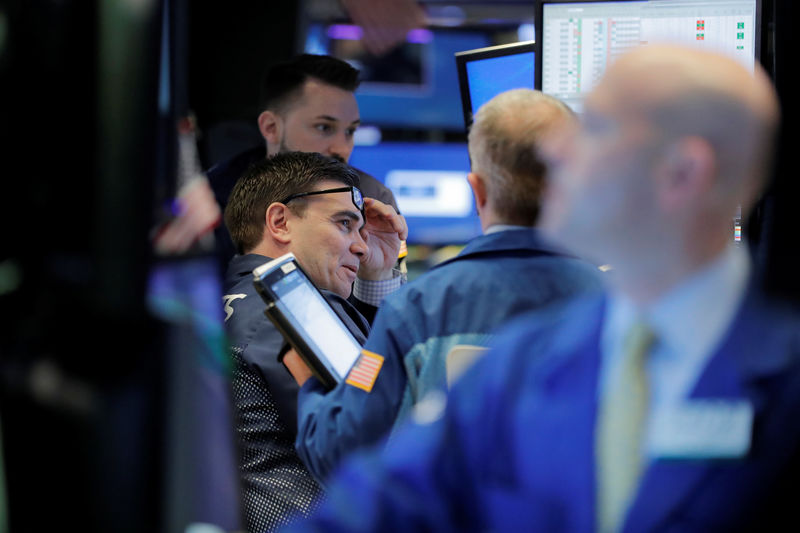By Marc Jones
LONDON (Reuters) - If last year's financial markets boom was down to a 'Goldilocks' global economy, 2018 has so far been all about the bears, with the worst start to a year for world stocks since 2010.
A grizzly mix of U.S.-China trade tensions, central banks turning off the money taps and cooling growth in hotspots including Europe has wiped a trillion dollars off MSCI's 47-country world index.
A pumped-up dollar (DXY), which has had its best first half in three years, and a 16 percent leap in oil prices (LCOc1) have played a big role too clobbering emerging markets particularly hard.
Argentina's peso <ARS=> and Turkey's lira <TRY=> have been shredded 30 and 17 percent, respectively, Chinese stocks have entered bear market territory and EM equities (MSCIEF) have slumped 10 percent, or 17 percent excluding a brief January surge.
"People just woke up to the fact that something has changed," said London & Capital's Chief Investment Officer Pau Morilla-Giner.
As well as the escalation in global trade tensions "there has been a realization that the big central banks aren't thinking about stimulating the economy anymore, they are trying to build up capacity in case of recession."
(Graphic: World stocks have worst H1 since 2010 - https://reut.rs/2IyNguk)
Still, it hasn't been a doom-fest everywhere.
One Wall Street bellwether, the S&P 500 (SPX), is clinging on in positive territory and while the trade jitters have sapped the Dow Jones Industrial (DJI), the Nasdaq (NDX) has set records this month.
As a set, the FAANGs (Facebook, Amazon, Apple (NASDAQ:AAPL), Netflix (NASDAQ:NFLX) and Google (NASDAQ:GOOGL)) are up almost 40 percent despite having $400 billion wiped off their combined value in March when it was revealed Facebook misused 50 million of its users' data.
Netflix has more than doubled in price this year, Amazon (O:AMZN) is up 45 percent and Facebook (O:FB) is fully recovered and up over 11 percent. Also, for all the pressure heaped on China in recent months, its tech giant Alibaba (K:BABA) is up 11 percent.
YUAN TO AVOID?
Among the major currencies, the dollar is up almost 3 percent against the euro (EUR=) and nearly 2 percent versus the safe-haven yen <JPY=> (DXY).
For emerging markets that rise has been a wrecking ball. On top of the ailing lira and peso, Brazil's real is down 14 percent, India's rupee 7 percent, South Africa's rand 10 percent and - despite the oil rally - Russia's rouble 9 percent.
(Graphic: EM FX H1 performance - https://reut.rs/2NaEzu7)
Having been the stars of 2017, MSCI's EM equities index (MSCIEF) is down 8 percent and local currency and dollar-denominated EM bonds have fallen 6 percent and 5 percent respectively .
What has caused the most concern though has been China.
Stocks there entered a bear market this week having dropped 20 percent from their January peaks, while the yuan <CNY=CFXS> has just had its worst month on record.
With China the biggest consumer of industrial commodities, its misfiring economy has also contributed to the respective 9 and 15 percent declines in the price of copper and zinc , used in things like pipes and galvanized steel.
"What tends to move markets the most tends to be issues with China," said Sharmin Mossavar-Rahmani, Chief Investment Officer for Private Wealth Management at Goldman Sachs (NYSE:GS), saying it was both her biggest short-term and longer-term worry.
"These tensions with the U.S. are not going to disappear, they are just going to ebb and flow," she said, adding the economy was also imbalanced and had very high debt levels.
Another 2017 high-flier, cryptocurrency Bitcoin (BTC=BTSP), has lost 60 percent, but even traditional safe havens have failed to provide protection over the last few months.
Another two U.S. interest hikes have seen Treasuries (US10YT=RR) cost holders 3 percent this year and German Bunds (DE10YT=RR) and gold <XAU=> are both down 4 percent.
Italy's government bonds meanwhile have plunged 13 percent this quarter as an anti-establishment government took charge in Rome and the European Central Bank confirmed its mass bond buying program will end this year.
In contrast to Wall Street and Japan's Nikkei's solid first halves, euro zone stocks are down too, having lost roughly 6 percent.
(Graphic: Global markets in H1 2018 - https://reut.rs/2IBX1Im)
